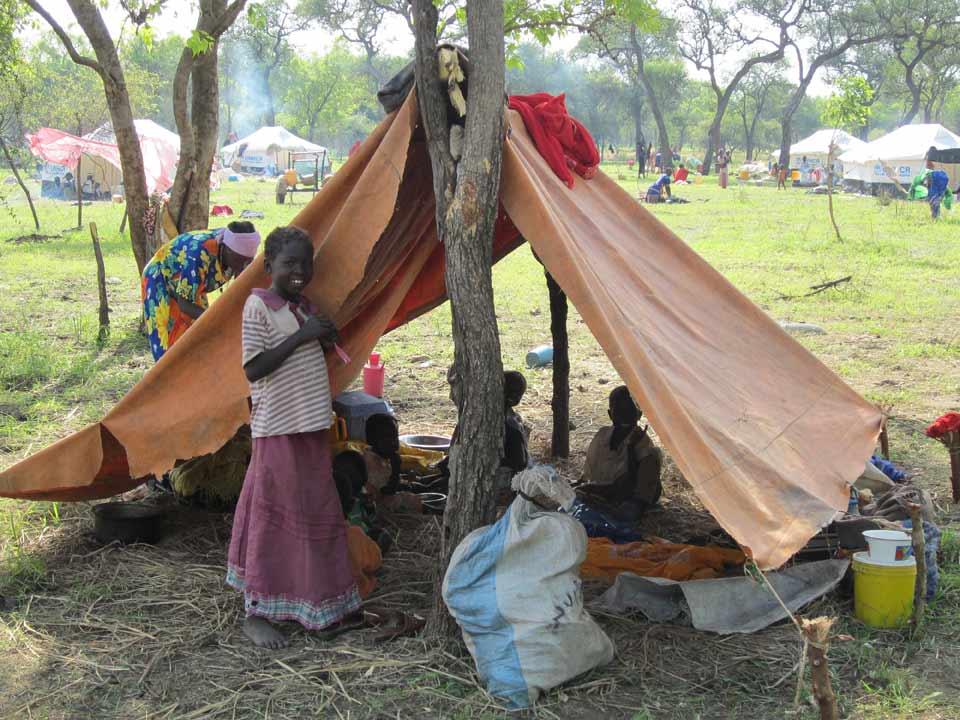Helping the Smallest the Most

A newly-arrived family to Upper Nileâs Yusuf Batil camp settles into temporary shelter while waiting to receive a tent. © LWF/M. Retief
LWF: Urgent Action Needed for Children Caught in Sudan Crisis
BUNJ, Maban County, South Sudan/GENEVA, 28 September 2012 (LWI) – As humanitarian aid agencies in South Sudan’s Upper Nile state struggle to cope with the massive numbers of refugees arriving from Sudan and difficult weather conditions, children remain particularly vulnerable.
The Lutheran World Federation (LWF), a founding member of the ACT Alliance, will focus its response to the desperate situation on children, who comprise more than 50 percent of the estimated 170,000 refugees in camps and settlements across South Sudan’s Unity and Upper Nile states.
Since October 2011 conflict between Sudan and South Sudan and food shortages have forced the people of Blue Nile to flee from their homes in the tens of thousands. The influx includes large numbers of unaccompanied minors or children who have been separated from their families.
Around 1,000 refugees have been arriving in refugee camps daily since June, with thousands flowing into Yusuf Batil camp which was opened to assist these people in particular. But this camp is now overflowing so the United Nations High Commissioner for Refugees (UNHCR) has opened another camp close by to cope with the need.
At Yusuf Batil and Gendrassa camps in Maban county, the LWF will be looking at setting up child friendly spaces, ensuring child protection and providing educational facilities.
For many of these refugees, the journey of flight has spanned months. Seasonal rains, which began in June, are having a devastating effect. Large families huddle under wet blankets at night and others struggle to keep dry in ankle deep water.
“To be able to assist the many people in need in the new camp … we need considerable financial assistance. Any donation will help us work with setting up schools and assisting the numerous children, who need protection and support in the camps,” said Michael Hyden, program officer for Eastern Africa at the LWF.
Providing Schools and Protection
Protecting these children is complex and difficult. Foster families need to be found and supported to take care of those who are alone. Child protection workers and teachers need to be recruited and trained, and child-friendly spaces need to be created to help children recover from their experience and continue their education.
But LWF has a sound track record of protecting children in refugee camps and providing education programs in neighboring Chad, Djibouti, Ethiopia and Kenya. “Even though the operation in Upper Nile is new, we are building on the expertise we have gained from our operations in Kakuma, Dadaab [the world’s largest refugee camp] and Djibouti, where the LWF has been working … for a number of years,” Hyden explained.
He said the LWF’s response for the next eight months requires at least USD 2.5 million for which an appeal has been sent out to the ACT Alliance and UNHCR. With only 30 percent of the target funds available until the end of the year, immediate assistance will include delivery of materials to lay the foundation for the work to be carried out in partnership with the UNHCR and other organizations.
Maban county is among the most remote and least developed areas in South Sudan, and the only way to get there during rains is by air or boats. The extremely high cost of fuel and scarcity of materials because of South Sudan’s conflict-fuelled economic crisis exacerbate the situation, making any humanitarian response extremely expensive, Hyden added.
The unresolved political issues between Sudan and South Sudan also have an impact on the local environment. The growing population in the camps is compounding tensions between impoverished local communities and refugees, as competition grows over scarce water sources and thousands of trees are cut down for construction at refugee settlement sites.
(Written for LWI by Melany Markham)

